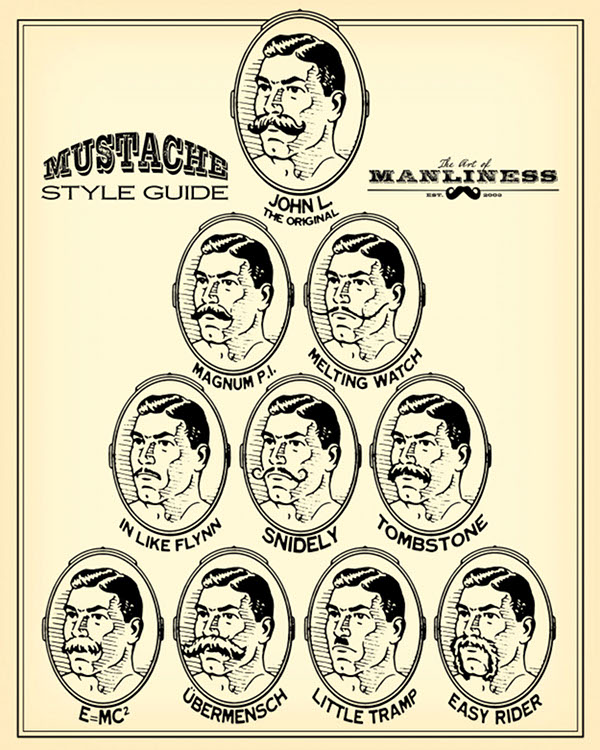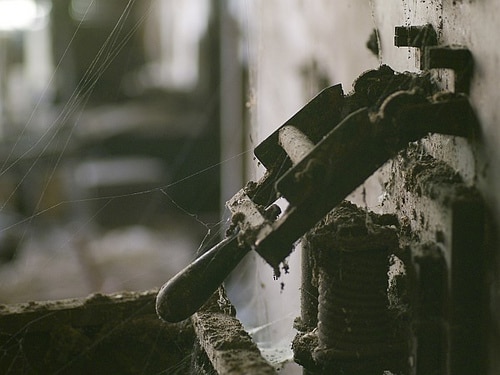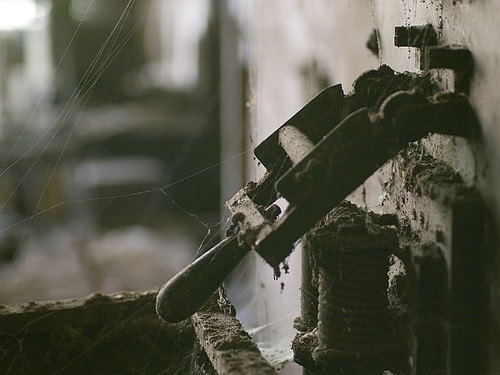
This post begins our series on the five switches of manliness. The five switches of manliness are the power switches that are connected to our primal man and deeply ingrained and embedded in the male psyche. When they’re turned off, we feel restless, angry, and apathetic. When they’re turned on, we feel alive, invigorated, motivated to be our best, and just plain manly. The two principles behind these posts that must be adopted in order for the recommendations to be successfully integrated are: 1) the switches are simply either on or off, and 2) turning them on requires only small and simple changes in behavior. The biggest obstacle to flipping the switches will be pride–the belief that firing up our masculinity requires arduous, mystical, and/or perfectly “authentic” tasks. Just because you cannot do everything, does not mean you cannot do something. The maxim to adopt is this: “By small and simple means I will flip the switches of manliness.”
When seeking to activate the deeply encoded parts of primitive masculinity, there is no better place to start than physicality. Primitive man used his body all day every day: building, hunting, walking, dancing, fighting.
For modern man, these activities have been replaced with sitting. Many of us sit for twelve hours or more a day. Sit down for breakfast, sit in the car on the way to work, sit at your desk all day, sit in your car on the way home from work, sit in front of the tv at night….Rinse and repeat.
Sitting represents the ultimate in passive living; it practically shuts your body down–your heart rate, calorie burn, insulin effectiveness, and levels of good cholesterol drop as your risk of obesity and diabetes goes up. Or, as Dr. James Levine, leader in the emerging field of “inactivity studies,” puts it: when you sit, “the muscles go as silent as those of a dead horse.”
“Excessive sitting,” Dr. Levine says, “is a lethal activity.” And he’s not kidding. A study found that men who sit for more than six hours of their leisure time each day had a 20% higher death rate than those who sat for three hours or less. The epidemiologist who conducted the study, Alpha Patel, concluded that excessive sitting literally shortens a person’s life by several years (not to mention the years that are simply wasted from sitting as opposed to doing anything). Another study showed that men who sat for 23 or more hours a week had a 64% greater chance of dying from heart disease than those who sat for 11 hours per week or less.
Not only is sitting around literally killing us, it’s also throwing a wet rag on our manliness. As Dr. Levine observed:
Go into cubeland in a tightly controlled corporate environment and you immediately sense that there is a malaise about being tied behind a computer screen seated all day. The soul of the nation is sapped, and now it’s time for the soul of the nation to rise.
Made to Move

Nearly every top killer in the Western world–heart disease, stroke, diabetes, depression, hypertension, and a dozen other forms of cancer–was unknown to our ancestors. They didn’t have medicine, but they did have a magic bullet–or maybe two, judging by the number of digits Dr. Bramble was holding up. “You could literally halt epidemics in their tracks with this one remedy,” he said. He flashed two fingers up in a peace sign, then slowly rotated them downward until they were scissoring through space. The Running Man. “So simple,” he said. “Just move your legs. Because if you don’t think you were born to run, you’re not only denying history. You’re denying who you are.” -Christopher McDougall, Born to Run
Our bodies were made to move. We’re beings of flesh, bone, and muscle. If we weren’t designed to move, we would have evolved to be great blobs of tissue–human clams.
And we didn’t evolve to move slowly, either. We’re made to move vigorously for long periods of time…to run, and run far.
How do we know this? It’s written into our anatomy. Unlike humans, walking animals like chimps lack an Achilles tendon and an ample gluteus maximus–both of which are needed for running–as well as the nuchal ligament, which keeps the head steady when an animal is moving quickly. For a long time scientists puzzled over why we have such features and yet are such seemingly ineffective runners…what was the evolutionary advantage behind our slow and steady running ability?
The answer is “persistence hunting.” Primitive tribes hunted by running down an animal until the prey dropped dead of exhaustion. The fact that humans could run for hours on end without overheating was a distinct survival advantage.
Women likely joined in these persistence hunts as well (athletic parity between the sexes increases as distance increases; some of the top finishers in ultra races like the Leadville 100 are women). But a greater share of the hunting and heavy labor fell to men. Researchers speculate that this is why, while men and women have the same number of sweat glands, men sweat more than women. Regardless of fitness level, women’s bodies are less effective at sweating, and thus dissipating body heat than men, because, researchers hypothesize, women could stay in the shade more frequently, while men had to have greater protection from overheating while out in the sun chasing the herd.
So running is what we were born to do. And of course our bodies show us that we were made to move in ways that extend far past a long jog. Our arms and grip, quadriceps and hamstrings reveal a body crying out to push and pull, lift and grab.
How a Sedentary Lifestyle Keeps This Switch of Manliness Off

Perhaps all our troubles–all the violence, obesity, illness, depression, and greed we can’t overcome–began when we stopped living as Running People. Deny your nature, and it will erupt in some other, uglier way. -Christopher McDougall, Born to Run
If we were made to move, then remaining sedentary is going to have dire consequences for our motivation and vitality. Let’s take a look at some of those consequences.
A sedentary lifestyle makes us depressed.
When men are depressed, we feel angry, apathetic, and unmotivated. While we often think about our brains when we think about depression, perhaps we should look to our bodies first.
If our bodies are made to move, then sitting passively all day is like, as we mentioned last time, keeping a well-trained regiment of soldiers who are itching to fight in perpetual reserve. Angst and anxiety will naturally follow.
Anyone who has exercised regularly is familiar with the phenomenon of the “runner’s high.” It has been described by researchers as:
pure happiness, elation, a feeling of unity with one’s self and/or nature, endless peacefulness, inner harmony, boundless energy, and a reduction in pain sensation.
That’s a pretty powerful feeling. Can you really expect to feel fully alive without a regular dose of it? It’s no wonder that studies have shown that exercise is just as effective as antidepressants in treating clinical depression.
A sedentary lifestyle makes us anxious.
I know men who can’t move ahead in life because they’re crippled by stress and anxiety. When challenged by setbacks, they curl up in the fetal position. Oftentimes, these men who struggle with their resilience are men who are not physical in their lives. It’s not a coincidence. A study done on rats showed that when the rats exercised, they created brain cells that were better able to deal with anxiety, creating a more stress-resistant brain. Says Michael Hopkins, neurobiology researcher:
“It looks more and more like the positive stress of exercise prepares cells and structures and pathways within the brain so that they’re more equipped to handle stress in other forms. It’s pretty amazing, really, that you can get this translation from the realm of purely physical stresses to the realm of psychological stressors.”
In addition to making our brains more steely over the long run, exercise has also be found to offer immediately soothing benefits. Researchers have found that exercise increases the levels of endocannabinoid molecules in our blood, the same endocannabinoids that are responsible for the pleasure and pain relief produced by the consumption of marijuana. So exercise let’s you take the edge off, without a single negative side effect.
A sedentary lifestyle kills our confidence.
Men who exercise gain more confidence because they’re happier, more relaxed and resilient, and feel more comfortable in their typically fitter bodies. But I think the biggest way exercise boosts a man’s confidence is that it gives him the experience of consciously and purposefully putting himself in pain.
If you watch any weight-loss show, you’ll notice that the person’s transformation goes though a predictable pattern. When the obese person first starts exercising, they hate it–they yell at the trainers, talk about how much they detest sweating, break down in tears (more frequently seen in female contestants), excessively whine, and generally give up, sure that they can’t go on. They’ve never exercised before and so the feelings of exercise–the shortness of breath, the burning, the sweating–feels foreign and terrible. It’s a shock to a system. Unless we make a concerted effort to get outside our comfort zones, we can glide through life very comfortably, with minimal sweating, minimal pain.
So it’s important for a man to be familiar and comfortable with what physical pain feels like, to have the knowledge that it’s not the end of the world and that he can endure it. Running has indeed been shown to boost our pain threshold; it takes a higher dose of pain for the fit man to cry uncle. Confidence grows when you feel you are up to whatever task lies before you and you know that your mind can overcome the desires of your body.
A sedentary lifestyle saps our virility.
And finally, we get to the very heart of the issue. So much of what makes men unique can be linked to the hormone testosterone. Men and women both have testosterone, but men tend to have it in greater quantities. It’s what’s responsible for the hair on our chest and faces, our lower voices, and bigger muscles–in short, all the outward marks of manhood. And testosterone is not only responsible for how we look on the outside, but how manly we feel on the inside. A lack of T makes a man feel depressed and shiftless, devoid of that drive and aggression that fuels our manliness.
Testosterone levels have been steadily falling for men over the last couple of decades, and a variety of factors are cited for this decline, from environmental toxins to diet. But we really need to look no further than the increase in time spent sitting on our asses. Strenuous exercise and weight lifting boosts our T, sitting around kills it, and the more we sit around, the less motivated we feel to get out and work out, and the cycle continues.
Vigorous exercise must be a part of every man’s life. There’s something about the feeling of sweat dripping down your body, the blood and testosterone coursing through your veins, and the lactic acid pumping through your muscles after a tough workout that makes you feel supremely manly and ready to take on the world.
How to Flip On the Switch of Physicality
 Living a sedentary lifestyle keeps this switch of manliness in the off position. Getting active switches it on.
Living a sedentary lifestyle keeps this switch of manliness in the off position. Getting active switches it on.
There are two aspect to flipping this switch:
1. Get in a bout of vigorous activity several times a week.
Do something that makes you sweat buckets and puts you in pain. You need to rediscover your body and what it feels like to push it to its limits.
- Run. There’s no better way to purely connect with those primal instincts. And it’s cheap and convenient. Just lace up your shoes and head out the door.
- Pump iron. Do compound exercises. They’re good for the body and good for your T.
- Join Crossfit.
- Do High Intensity Interval Training (HIIT). The best workout there is. Do 20 minutes, where you alternate a minute of rest with a minute of all-out, balls to the wall exertion. Do it on the stairs and you’ve got the world’s most effective exercise. There’s no better path to copious sweat and pain.
- Take up parkour.
- Work out like an oldtime strongman. Swing the kettlebell, throw medicine balls, flip over tires.
- Don’t listen to music when you work out. I know, the music helps you take your mind off things. That’s exactly what’s wrong with it. Zoning out severs the connection between body and mind and keeps you from being fully present in your physicality, which is the whole point of exercise.
Switch Accelerators: Want to flip the switch faster and increase the manly boost you get from it? Switch Accelerators add an extra power boost:
- Take up a martial art or combat sport. Fighting gets you in touch with your aggressive, competitive, primal side.
- Hit a heavy or speed bag. Even when you’re not whaling on another man, simply kicking and punching for your workout relieves a lot of stress and makes you feel pumped up and manly.
- Start a lunchtime pick up game of basketball, football, ultimate frisbee, etc. Some friendly competition really ups the positive benefits of exercise.
- Work out outside. Exercising in the great outdoors is far better than doing it inside a gym. More on this when we get to the Nature Switch.
2. Incorporate more physicality into your day to day life.
Exercise is great but this switch won’t get flipped if you work out for one hour a day and sit around for fifteen. Not only will an isolated bout of exercise not cure your malaise, but scientists have shown that it won’t counteract the ill-effects of excessive sitting on your health either. Instead, you need to find little ways to move more throughout your day. Obese people make an average of 1,500 little movements a day and spend 600 minutes sitting; farm workers make 5,000 daily movements and spend only 300 minutes sitting. The closer you can get to moving as much as primitive man, the more physical you can make your life, the more motivated and manly you will feel.
Every little bit helps. Even fidgeting is believed to up your fitness. Remember, small and simple.
- Take an evening walk after dinner. This is great if you’ve got a baby–it gets you moving and out of the house and keeps the baby quiet and occupied. Ahhh.
- Get a dog so you have to go take walks.
- Bike to work.
- Make dinner yourself and wash the dishes by hand.
- Do a set of push-ups right after you get out of bed.
- Make household repairs by hand. Change your own oil or air filter.
- Take the stairs instead of the elevator.
- Purposely park your car far from the entrance to stores.
- Work standing up. You can buy a stand-up desk or place your laptop on the counter.
- Garden.
- Heat your home with a wood-burning stove and split the wood you need for it yourself.
- Pace back and forth when you’re talking on the phone.
- Do household chores, like raking the leaves, mowing the lawn, and shoveling snow yourself, instead of hiring someone to do it for you.
- Get up from your desk every hour and do 25 squats or push-ups.
- Install a pull-up bar in your door and crank out some reps every time you walk through it.
Switch Accelerator:
- Have lots of sex (in a committed relationship). It’s physical, it boosts your testosterone…and it’s sex.
Switches of Manliness Series:
The Cure for the Modern Male Malaise
Switch #1: Physicality
Switch #2: Challenge
Switch #3: Legacy
Switch #4: Provide
Switch #5: Nature







